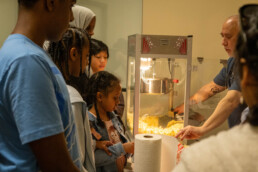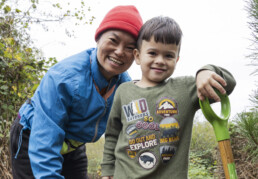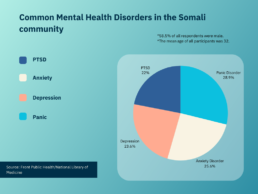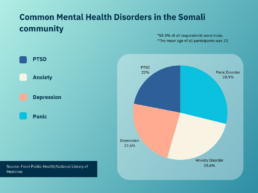2025 Eid Carnival Recap
The 2025 Eid Carnival was filled with love, laughter, and that unmistakable Eid joy we all cherish.
The evening kicked off with warm welcomes and festive décor that set the perfect tone. The space was transformed into a vibrant celebration. Guests enjoyed a delicious spread of food, sweet treats, and refreshing drinks that kept everyone smiling throughout the night.
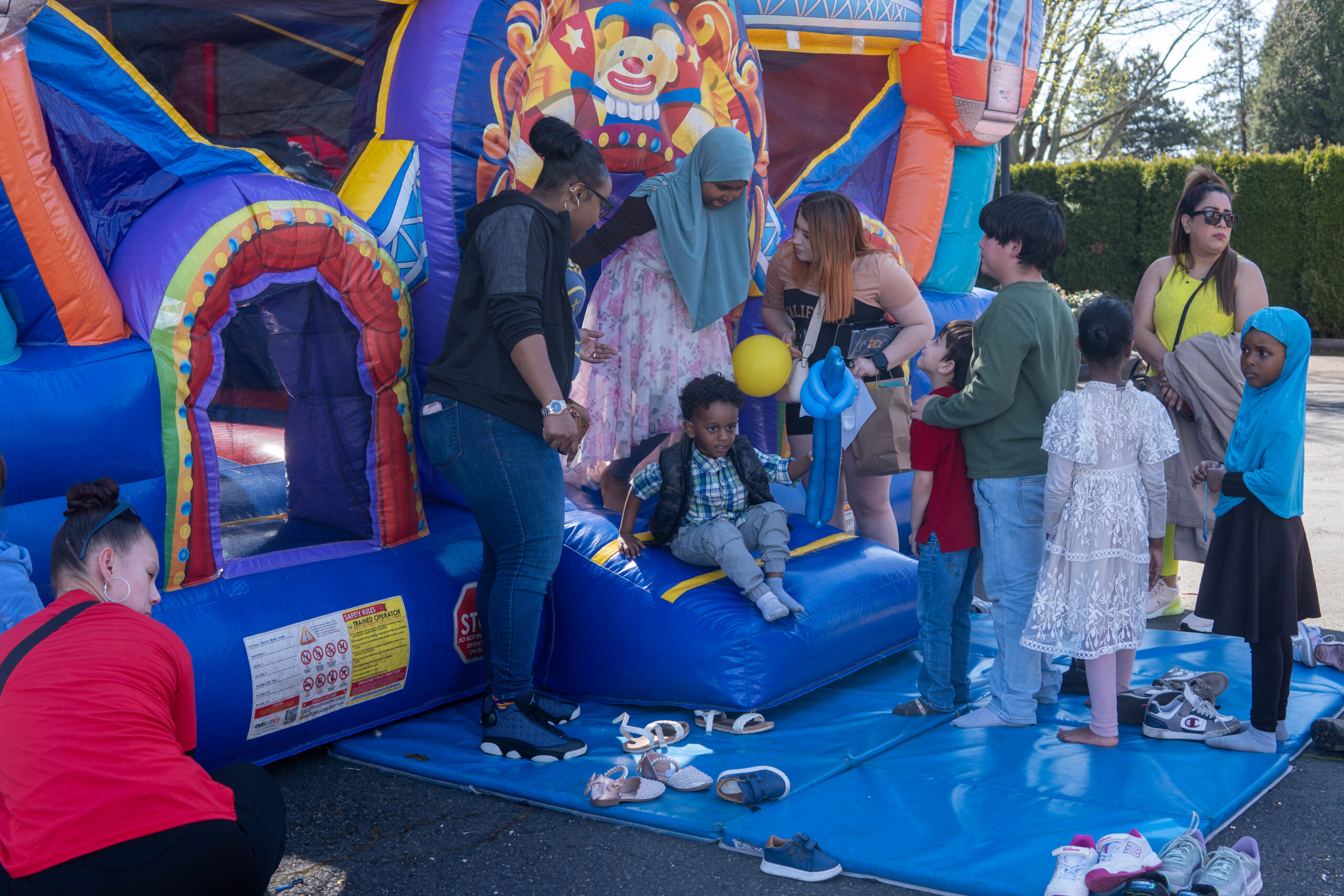 There was no shortage of fun with interactive carnival games for families, a bouncy house, balloonists, henna, a photobooth and plenty of laughter from the kids. Meanwhile, adults connected over good conversations and warm cups of coffee.
There was no shortage of fun with interactive carnival games for families, a bouncy house, balloonists, henna, a photobooth and plenty of laughter from the kids. Meanwhile, adults connected over good conversations and warm cups of coffee.
One of the most meaningful moments was seeing people from all walks of life, dressed in their best, coming together to celebrate Eid. It was a beautiful reminder of the strength, unity, and joy within our community.
A heartfelt thank you to our incredible volunteers, vendors, and the wonderful families who joined us. Your energy and support made this celebration truly unforgettable.
We are already looking forward to next year's Eid Carnival. Until then, Eid Mubarak from all of us at Voices of Tomorrow!

Spring Readiness: The Importance of Outdoor Play for Early Childhood Development
Written By: Zahra Mahamud
Spring is finally here! The days are getting longer, the air feels fresher, and little ones are eager to break free from the walls of winter. As we step into this season of renewal, it’s the perfect time to talk about the importance of outdoor play in early childhood development.
For many families, especially in colder climates, the transition from indoor activities to outdoor exploration can feel overwhelming. But the benefits of outdoor play far outweigh the hassle of muddy boots and extra layers. Let’s dive into why it’s essential and how we can support our little ones in making the most of this spring season.
The Benefits of Outdoor Play
Boosts Physical Health
Children need movement to grow strong and healthy. Running, jumping, climbing, and balancing help develop gross motor skills, coordination, and muscle strength. Fresh air and natural sunlight also support vitamin D production, which is crucial for bone health. Plus, outdoor play helps burn energy leading to better sleep (a win for everyone!).
Encourages Social and Emotional Growth
Outdoor play provides endless opportunities for children to practice communication, problem-solving, and teamwork. Whether they’re negotiating turn-taking at the slide or working together to build a sandcastle, these interactions help build confidence, resilience, and cooperation.
Supports Cognitive Development
Nature is the best classroom. Exploring different textures, sounds, and environments stimulates a child’s senses and encourages curiosity. Simple activities like counting rocks, observing insects, or building with sticks lay the foundation for early math and science skills.
Reduces Stress and Enhances Mental Well-Being
Just like adults, children experience stress. Time outside has been proven to reduce anxiety and improve mood. Unstructured play in natural environments allows kids to release energy, regulate emotions, and simply enjoy the moment without the pressures of structured learning.

How to Prepare for Outdoor Play This Spring
Dress for the Weather
Spring can be unpredictable: sunny one moment, rainy the next. Dressing in layers and having waterproof gear on hand ensures that the weather doesn’t limit playtime. Think rain boots, light jackets, and sun hats.
Create Safe and Engaging Play Spaces
Whether it’s a backyard, park, or community space, ensure the area is safe for children to explore. Remove hazards, check for age-appropriate equipment, and encourage open-ended play opportunities.
Follow Their Lead
Children are natural explorers. Sometimes the best thing we can do is step back and let them take the lead. Whether they’re digging in the dirt, collecting leaves, or making up imaginative games, they’re learning in ways we might not immediately recognize.
Make It a Daily Habit
Incorporating outdoor play into the daily routine doesn’t have to be complicated. A walk around the block, a trip to the playground, or even a picnic in the yard can make a big difference. The key is consistency: giving children the time and space to explore the world around them.
Spring is a season of growth, and there’s no better way for young children to experience it than through outdoor play. It’s more than just fun, it’s essential for their development. As caregivers, educators, and community members, we have the opportunity to create environments where children thrive, explore, and embrace the joys of childhood.
So, as the flowers bloom and the temperatures rise, let’s encourage our little ones to step outside, get their hands dirty, and discover all the wonders that spring has to offer.
Let’s make this season one of movement, laughter, and learning one outdoor adventure at a time.
The Hidden History of Black Educators Who Transformed Early Childhood Education
Written By: Zahra Mahamud
Throughout history, Black educators have played a crucial yet often overlooked role in shaping early childhood education. Their work has influenced policies, teaching methods, and advocacy efforts that continue to benefit marginalized and immigrant communities today. At Voices of Tomorrow, we recognize the importance of honoring these pioneers and carrying forward their mission of equitable, culturally responsive education.
The Role of Black Educators in Early Childhood Development

Dr. Edmund Gordon: Architect of Head Start
Dr. Edmund Gordon, a psychologist and educator, was a key figure in the creation of Head Start, a national program that provides early learning opportunities to children from underserved backgrounds. His research emphasized the importance of early childhood intervention in closing achievement gaps, a principle that still guides equitable education efforts today.
Septima Clark: The "Mother of the Movement"
Septima Clark was a trailblazing educator and civil rights activist who founded Citizenship Schools. These schools taught literacy and civic engagement to Black adults, empowering communities through education. Her belief that education is a fundamental tool for social change remains an inspiration for those working to ensure access to quality learning for all children.
How Their Work Laid the Foundation for Today’s Culturally Responsive Education
Many early Black educators championed inclusive curriculums, bilingual education, and parent involvement concepts that are central to Voices of Tomorrow’s mission. They understood that culturally relevant learning environments not only foster academic success but also strengthen community identity. Their work in establishing community-based education models directly parallels modern early learning programs, particularly those serving immigrant and refugee families.

The Impact on Immigrant & Refugee Families
Black educators’ advocacy for equitable education laid the groundwork for today’s bilingual and multicultural learning programs. Their push for culturally affirming education has benefited generations of children, including immigrant and refugee families navigating new education systems. Voices of Tomorrow builds on this legacy by supporting African immigrant families in preserving language, embracing cultural identity, and accessing early learning resources.
What We Can Learn from Their Legacy
Black educators' dedication to the fight for quality education offers invaluable lessons for today’s early learning advocates. Voices of Tomorrow continues this tradition by centering community engagement, representation, and culturally relevant teaching. As we strive to create inclusive and equitable learning environments, we honor those who paved the way and reaffirm our commitment to advocacy, empowerment, and education for future generations.
Their contributions remind us that education is more than a system, it is a means of liberation, opportunity, and community transformation.
References
Gordon, E. W. (1995). Education and social policy: A historical perspective on Head Start.
Clark, S. (1986). Ready from Within: A First-Person Narrative. Wild Trees Press.
Ladson-Billings, G. (1995). Toward a Theory of Culturally Relevant Pedagogy. American Educational Research Journal.
Banks, J. A. (2004). Multicultural Education: Historical Development, Dimensions, and Practice.
Raising Our Voices for Child Care: A Day of Advocacy in Olympia
Written By: Zahra Mahamud
The steps of the Washington State Capitol became a space for community, conversation, and hope as Voices of Tomorrow joined parents, childcare providers, and advocates for Child Care for Washington Advocacy Day to make sure the voices of those most impacted by the childcare crisis were heard.
From the moment we arrived, a deep sense of purpose filled the air. Parents held their children close, providers stood shoulder to shoulder, and stories of struggle and perseverance were shared. This was not just about policy; it was about people. These are families forced to make impossible choices, providers giving everything to this work, and women dedicating their lives to ensuring that every child gets the early learning foundation they deserve.
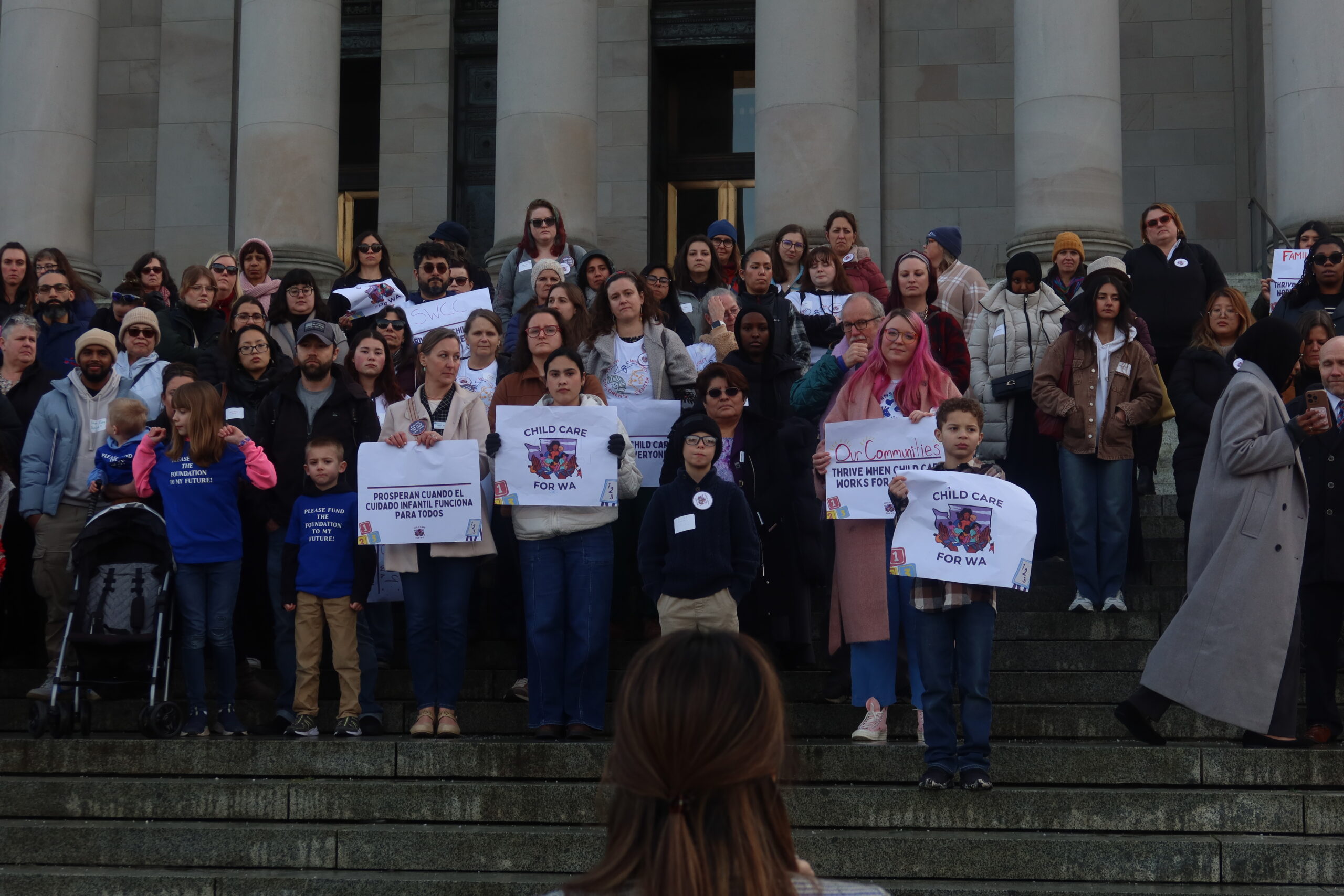 Stories That Demand to Be Heard
Stories That Demand to Be Heard
One of the most powerful moments of the day came when Genevieve Stokes from Child Care Aware Washington shared her journey of navigating Washington’s childcare system. She discussed the financial struggles parents face when trying to afford childcare and how it forces many to leave their jobs. She stated, "Unfortunately, too many parents, including here in the audience, can't afford quality childcare but don't qualify for childcare support. Too many parents are making impossible choices, quitting their jobs and careers to care for their children. I'm looking at the women in the audience who have had to try and figure that decision out, but only to find that they can't manage their family's finances if they don't work."
A provider, Susan Lee, who runs a childcare center, spoke passionately about the challenges childcare providers face. She emphasized her commitment to serving immigrant, refugee, and low-income families and highlighted the financial struggles of running a childcare center. Susan stressed that the state’s Working Connections Child Care (WCCC) subsidy program does not provide enough funding to sustain high-quality early learning programs. She spoke about the sacrifices providers make, often working long hours or taking on additional jobs just to keep their centers running. "Why do we need to continue to be creative and sacrifice our time? Why do teachers continue to need to work a second or third job so that they can continue to provide for their families? That's not right. Our children deserve better, and so do the educators who dedicate their lives to them."
These stories are not isolated; they are the reality for thousands of families and providers across the state. And yet, despite the challenges, there was resilience. There was a collective commitment to keep pushing forward, to keep speaking up, and to keep advocating for a system that works for everyone.
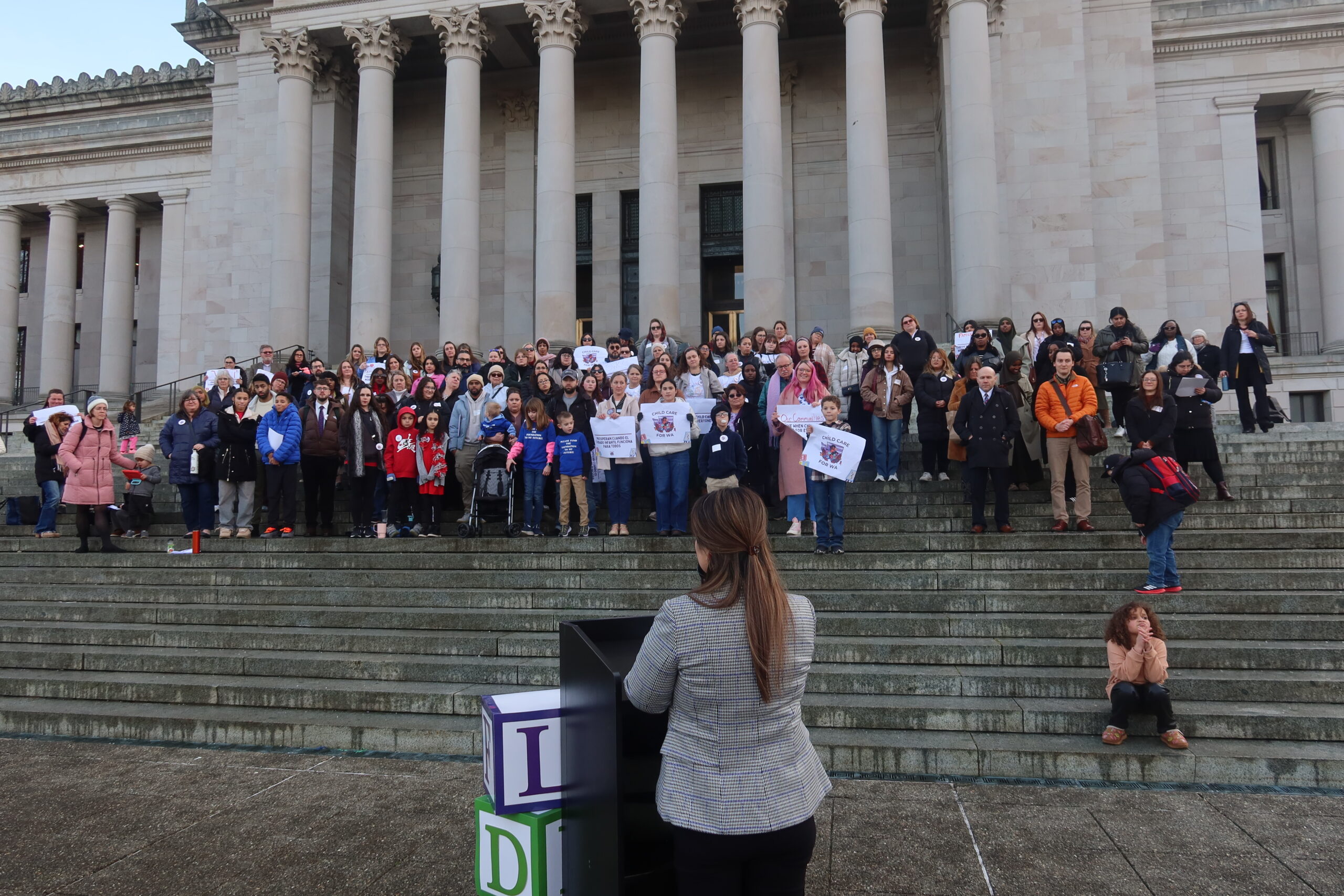 Why Voices of Tomorrow Stands in This Fight
Why Voices of Tomorrow Stands in This Fight
At Voices of Tomorrow, our mission has always been to support the communities most impacted by systemic barriers. The childcare crisis disproportionately affects women, especially women of color, immigrant families, and working mothers. This fight is not just about affordability or accessibility; it is about equity, about ensuring that every child, regardless of their background, has the opportunity to thrive.
We stand with the parents who refuse to stay silent. We stand with the providers who continue to show up despite the odds. We stand with every advocate who believes that childcare is not a luxury but a necessity.
The Unrecognized Role of Child Care Providers
Throughout the COVID-19 pandemic, childcare providers played an essential yet often unrecognized role in keeping society running. Genevieve Stokes reminded us that while businesses and schools shut down, childcare centers remained open, making it possible for nurses, doctors, emergency responders, grocery store clerks, and other essential workers to do their jobs. These providers put themselves at risk every day, ensuring that families had the support they needed during a time of crisis. Their commitment and sacrifices deserve far greater recognition and investment.
The day in Olympia was a testament to the power of shared stories and collective voices. While no immediate policies were enacted, the conversations held, and the experiences shared were invaluable in building momentum for change. The fight for affordable, high-quality childcare continues, and the dedication of parents, providers, and advocates remains unwavering.
Coming together reaffirmed our commitment to ensuring every child in Washington gains access to the care and education they deserve. The path forward requires persistence, advocacy, and solidarity because when we speak up, we bring about the change that our families and communities need. As the event came to a close, the voices of children rose in unison on the Capitol steps, leading a powerful chant with the support of the audience:
Advocacy Day Chant 
Join us. Speak up. Advocate. Because every child deserves a future.
5 Easy Ways Parents Can Support Learning at Home
Written By: Zahra Mahamud
Parents play a vital role in fostering their children’s love for learning, and small actions at home can make a big difference. By creating a supportive learning environment, you can help your child succeed academically while preserving and celebrating their cultural heritage. At Voices of Tomorrow (VOT), we believe that parents are their child’s first and most important teachers. Through advocacy and empowerment, we strive to support families in nurturing learning and cultural pride. Here are five simple ways to support your child’s education at home, both in their native language and in English.
Read Together Daily
Reading with your child is one of the most effective ways to build literacy skills. Choose books in both your native language and English to strengthen your child’s language development in both. This not only boosts vocabulary but also reinforces cultural pride. Make reading a special, consistent part of your daily routine whether it’s bedtime stories or a quiet afternoon activity. VOT encourages families to prioritize literacy at home as a way to deepen cultural connections and foster a lifelong love of learning.
Create a Language-Rich Environment
Encourage learning by exposing your child to a variety of words and phrases in both languages. Label items around your home with words in your native language and in English. For instance, place a label on the refrigerator that says “refrigerator” and its translation. This visual reinforcement helps children expand their vocabulary while maintaining a connection to their heritage. VOT believes that creating bilingual learning environments at home is a powerful way to honor and preserve cultural traditions while supporting language development.
Incorporate Learning into Everyday Activities
Everyday tasks like cooking, grocery shopping, or even doing laundry offer opportunities to teach your child. Practice math skills by counting ingredients or calculating prices at the store. Introduce new vocabulary while preparing meals, naming utensils, or describing actions in both languages. These hands-on, real-world experiences make learning fun and practical. VOT encourages families to see everyday activities as opportunities to inspire curiosity and meaningful engagement in their children.
 Encourage Storytelling and Conversations
Encourage Storytelling and Conversations
Storytelling is a powerful way to develop language skills and nurture creativity. Share stories from your own childhood or cultural traditions and invite your child to tell their own stories. Encourage open-ended conversations in both languages, asking questions that spark curiosity. For example, ask, “What do you think would happen if…?” to encourage critical thinking and problem-solving. At VOT, we believe that storytelling is an essential tool for preserving heritage and fostering strong connections between generations.
Provide Access to Educational Resources
Make learning accessible by surrounding your child with educational tools like books, puzzles, and games in both languages. Use technology wisely by exploring apps and websites designed for bilingual learners. Many resources are available for free or at a low-cost, offering interactive lessons in subjects like reading, math, and science. Additionally, check with your child’s school or local library for bilingual materials and programs. We advocate for equitable access to educational resources and encourage families to explore community tools that promote bilingual learning.
By supporting your child’s learning at home in both their native language and English, you’re helping them build a strong academic foundation while fostering pride in their cultural identity. These simple strategies not only boost learning but also create meaningful connections that benefit your child for years to come. At Voices of Tomorrow, we’re committed to empowering families with ideas and encouragement as they guide their children toward a brighter tomorrow. Remember, your involvement and encouragement are the keys to your child’s success!
10 Children’s Books That Celebrate Diversity and Identity
Written By: Zahra Mahamud
Books have the magical ability to open minds and hearts, especially for children. Stories that celebrate diversity and identity not only help young readers see themselves reflected in the pages but also teach them to value the differences in others. Many beautiful books have been written to honor this mission, showcasing vibrant characters, cultures, and themes that resonate with children of all backgrounds.
At Voices of Tomorrow (VOT), we deeply understand the importance of fostering spaces where children and families can retain their identities while growing in a multicultural society. Stories like these are not just about representation; they are about empowerment, encouraging children to see their worth and inspiring families to celebrate their heritage unapologetically. By reading and reflecting on narratives that honor diversity, families can strengthen bonds and build a sense of pride and confidence that lasts a lifetime.

In The Colors of Us by Karen Katz, young readers are introduced to the spectrum of skin tones, celebrating the unique beauty of every shade. Similarly, Last Stop on Market Street by Matt de la Peña takes readers on a heartfelt journey through a city, revealing lessons about gratitude and finding beauty in everyday moments.
Self-love and family connections take center stage in Hair Love by Matthew A. Cherry, a charming story of a father helping his daughter embrace her natural hair. Ibtihaj Muhammad’s The Proudest Blue: A Story of Hijab and Family shines a light on the strength and pride that comes with wearing a hijab, as told through the eyes of a young girl inspired by her sister.
The complexities of fitting in and staying true to one’s roots are gently explored in The Name Jar by Yangsook Choi, where a young immigrant learns to cherish her cultural identity. In a similar spirit, All Are Welcome by Alexandra Penfold invites readers into a school where every child—regardless of background—is embraced and celebrated.
Grace Byers’ I Am Enough offers an uplifting affirmation of self-worth, encouraging children to see themselves as capable, strong, and deserving. Themes of acceptance continue in We Are All Wonders by R.J. Palacio, a touching reminder that differences make us extraordinary and that everyone deserves kindness.
In Eyes That Kiss in the Corners by Joanna Ho, a young girl learns to appreciate the distinct beauty of her Asian features, connecting her identity to family traditions and heritage. Meanwhile, Going Down Home with Daddy by Kelly Starling Lyons captures the warmth of familial bonds and the joy of celebrating shared history.
These stories remind us that representation matters. They offer children a chance to embrace their own identities while learning to appreciate the richness of the world around them. With their vibrant illustrations and powerful messages, these books inspire empathy, understanding, and a deep appreciation for the diversity that makes each of us unique.
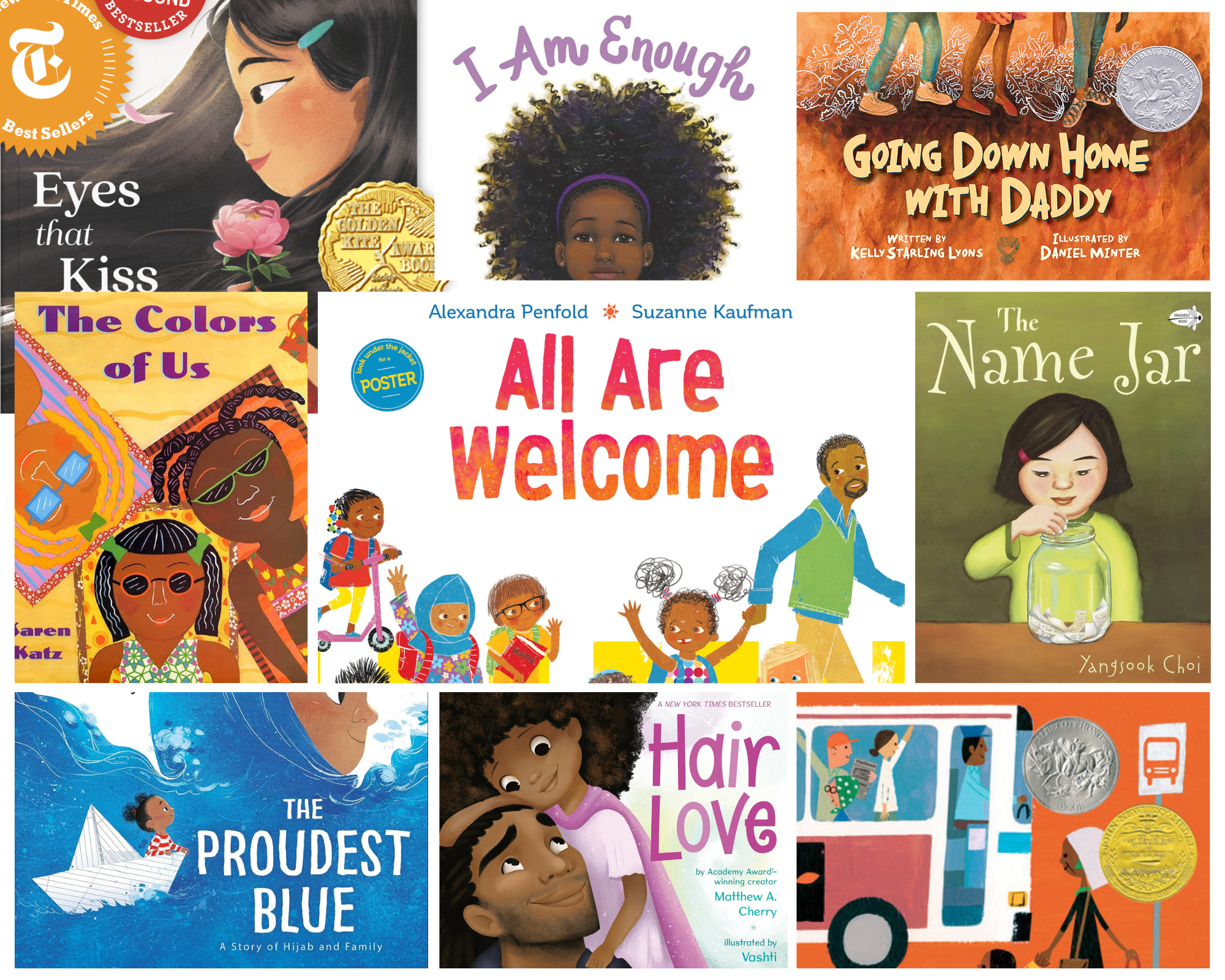
Books in Order:
- The Colors of Us by Karen Katz
- Last Stop on Market Street by Matt de la Peña
- Hair Love by Matthew A. Cherry
- The Proudest Blue: A Story of Hijab and Family by Ibtihaj Muhammad
- The Name Jar by Yangsook Choi
- All Are Welcome by Alexandra Penfold
- I Am Enough by Grace Byers
- We Are All Wonders by R.J. Palacio
- Eyes That Kiss in the Corners by Joanna Ho
- Going Down Home with Daddy by Kelly Starling Lyons
What’s Going on in Burien? Accessible Green Spaces: A Remedy for Winter Blues in Burien
Written By: Zahra Mahamud
Organization Highlight: Green Burien Partnership
As the days grow shorter and the air grows colder, many of us feel the weight of seasonal depression creeping in. During this time of year, green spaces become more important than ever, offering not just physical spaces to unwind, but also mental and emotional sanctuaries where we can reconnect, reflect, and rejuvenate.
One local organization is making sure these essential green spaces are protected and accessible to everyone: Green Burien Partnership.
About the Organization
Green Burien Partnership is a collaborative effort dedicated to restoring and maintaining Burien's parks and urban forests. Their mission goes beyond just planting trees they actively engage community members in meaningful environmental stewardship, ensuring that Burien’s natural spaces are preserved for all to enjoy.
What sets Green Burien Partnership apart is their commitment to equity and environmental justice. Recreation Coordinator Gabbi Gonzales describes it best:
“Green Burien Partnership is an urban forest restoration program that’s set steep equity goals and takes actionable steps to center communities farthest from environmental justice. Stewardship takes many forms in the Green Burien Partnership; we meet community where they live to teach green career skills, the calming aspects of green spaces, the value of relationship while restoring local green spaces. Healthy green spaces, specifically in communities bordering the airport, may reduce levels of some pollutants, including gases and particulate matter, and can [provide] numerous mental health benefits.”
Why This Matters
For many in Burien, especially those in neighborhoods impacted by airport pollution, having access to healthy green spaces isn’t a luxury it’s a necessity. These spaces offer cleaner air, reduce exposure to harmful pollutants, and provide a much-needed respite from the stresses of everyday life.
Parks are more than just open spaces; they are natural sanctuaries that foster physical health, mental well-being, and community connection. By maintaining and enhancing these parks, Green Burien Partnership creates opportunities for everyone to experience the restorative benefits of nature.
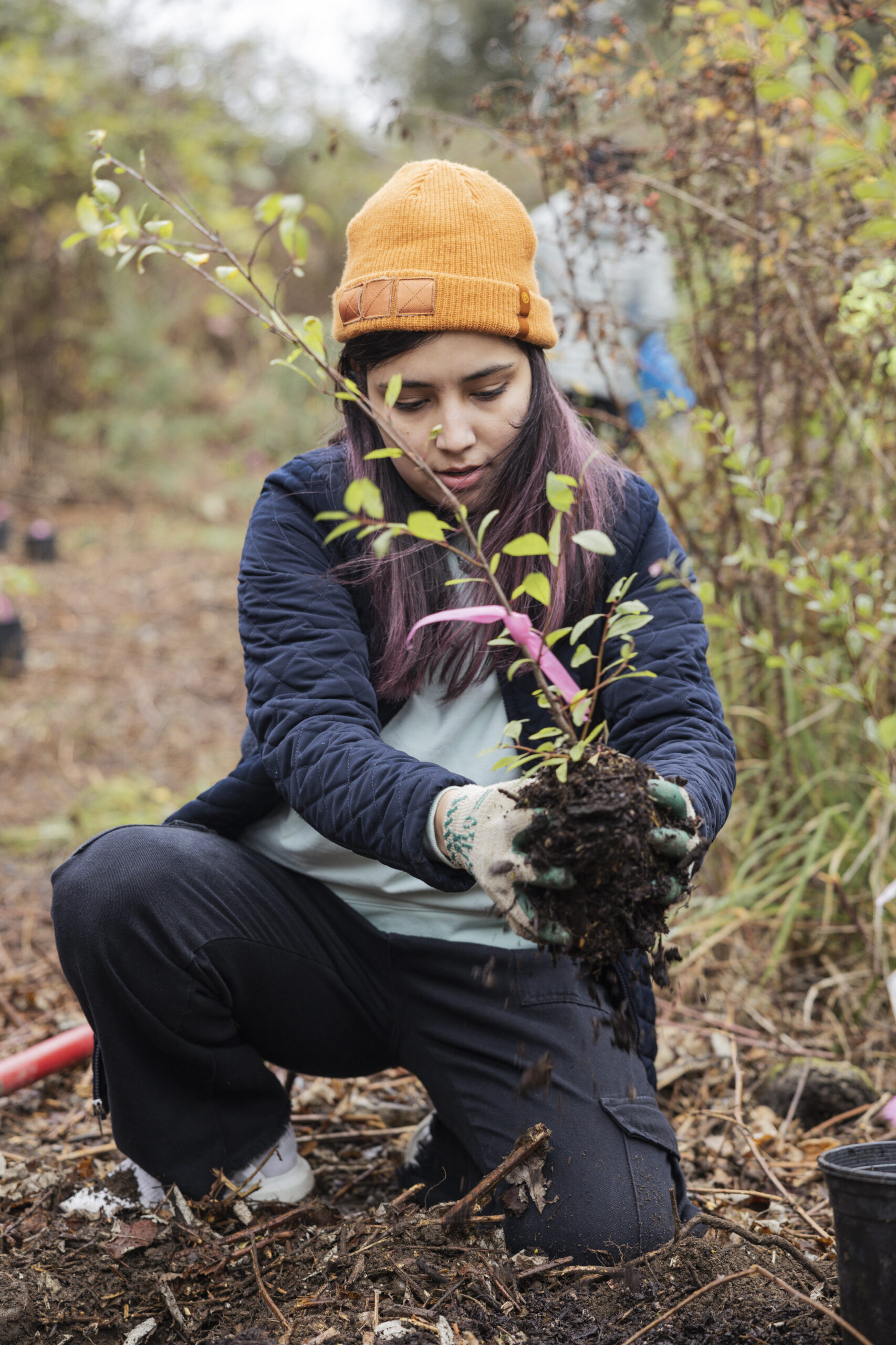
A Call to Action
Feeling the winter blues? One of the best ways to combat seasonal depression is to spend time outdoors. Burien is surrounded by Washington State’s breathtaking natural beauty and offers a wide range of parks perfect for restorative escapes.
Take a break. Step outside. Breathe in the crisp, clean air. Whether it’s a leisurely stroll, a brisk hike, or simply sitting quietly under the trees, reconnecting with nature in Burien’s well-cared-for parks can work wonders for your mental health. Let the beauty of these green spaces bring you clarity, calm, and a renewed perspective.
And while you’re at it, consider getting involved with Green Burien Partnership. Your participation helps sustain these invaluable spaces and supports an organization committed to equity, community, and environmental health.
How to Get Involved
While enjoying these green spaces, you might find yourself inspired to give back. Getting involved with Green Burien Partnership is a wonderful way to support their mission and help protect these invaluable community resources. They offer opportunities to volunteer, learn green career skills, and participate in community events focused on environmental restoration. Your efforts contribute to the health of local parks and the well-being of everyone who relies on them.
Spending time in nature isn’t just good for you it’s good for your community. By supporting initiatives like Green Burien Partnership, you’re helping ensure that these spaces remain accessible, equitable, and thriving for generations to come. So, bundle up, head outside, and let the beauty of Burien’s green spaces bring you peace and inspiration this season.
Nurturing Healthy, Happy, and Well-Developed Children: Essential Tips for East African Immigrant Families
Written by: Zahra Mahamud
Raising children in a new cultural environment presents opportunities and challenges, particularly for East African immigrant families striving to balance traditional values with the demands of modern life. At Voices of Tomorrow, we understand these families' unique obstacles and are committed to providing support that helps children thrive. This article offers practical tips on early childhood education, healthy eating, and mental health to help East African parents nurture their children's growth and development.
 Early Childhood Education: Laying the Foundation for Success
Early Childhood Education: Laying the Foundation for Success
Early childhood education plays a pivotal role in shaping a child's future. For East African immigrant families, it’s crucial to engage with your child's education while preserving cultural heritage. According to research from the National Institute for Early Education Research
(NIEER), children who attend high-quality early childhood programs are more likely to succeed academically and socially.
Integrate Cultural Learning: Reading to your child daily is a powerful way to support language development. Consider incorporating books in both English and your native language to reinforce bilingual skills and maintain a connection to your cultural roots. Additionally, engage in play-based learning that encourages creativity, problem-solving, and social interaction. Simple games like building blocks, puzzles, and role-playing can significantly contribute to cognitive development.
Balance Tradition and Modern Education: While it's important to embrace the educational practices of your new environment, don’t forget to teach your children about their cultural heritage. This balance will help them develop a strong sense of identity and pride in their background.
Nutritional Tips: Healthy Eating for Growing Children
A well-balanced diet is crucial for your child's physical and cognitive development. Unfortunately, many immigrant families face challenges related to food insecurity, which can impact their children's health. The Centers for Disease Control and Prevention (CDC) reports that healthy eating habits established in childhood can lead to better health outcomes throughout life.
Embrace Traditional Foods: An East African cuisine offers many nutritious options that are both delicious and culturally significant. A well-balanced diet can be achieved by incorporating fresh vegetables and fruits, which are rich in essential nutrients. Including these traditional foods in your child's diet not only supports their health but also helps maintain a strong connection to your cultural heritage.
Prioritize Fresh, Whole Foods: Processed foods, often high in sugar, salt, and unhealthy fats, should be limited. Cooking at home allows you to control ingredients and ensure your family is eating healthily. Encourage your child to eat a variety of foods from all food groups such as fruits, vegetables, grains, protein, and dairy to support their growth and development.
Hydration Matters: Encourage your child to drink water regularly, avoiding sugary drinks that can lead to dental issues and obesity. Herbal teas, especially those traditional to East African culture, can be a healthy and comforting alternative.
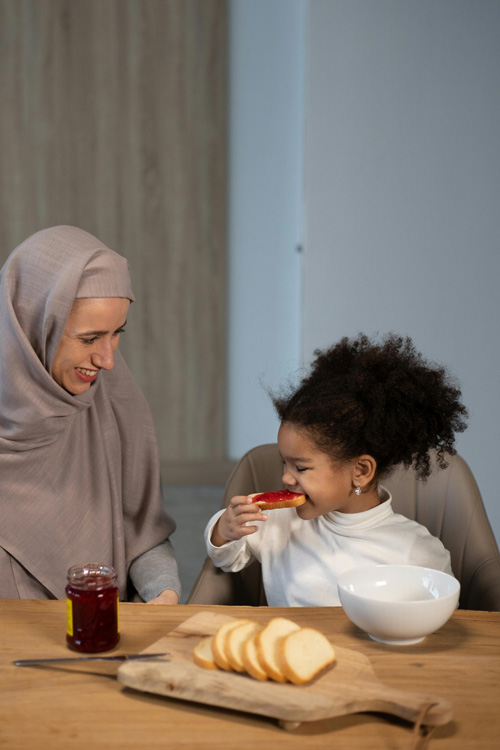 Mental Health in Children: Building Resilience from a Young Age
Mental Health in Children: Building Resilience from a Young Age
Mental health is a critical component of overall well-being, yet it’s often overlooked, especially in young children. The American Psychological Association (APA) highlights that immigrant children may face unique stressors, including language barriers, cultural adjustment, and the pressure to succeed in a new environment. These stressors can significantly affect a child's mental health if not addressed early.
Create a Supportive Environment: Children thrive when they feel safe, loved, and supported. Encourage open communication within the family, allowing your child to express their feelings and concerns. Show empathy and understanding, particularly when they are navigating the complexities of adapting to a new culture.
Teach Coping Skills: Equip your child with strategies to manage stress, such as deep breathing, mindfulness, and physical activity. These practices can help them develop resilience and emotional regulation.
Monitor for Signs of Stress: Be attentive to changes in your child's behavior, such as withdrawal, irritability, or difficulty sleeping. These could be indicators of stress or anxiety. If necessary, seek professional support to address these issues early.
Foster Social Connections: Encourage your child to build friendships and participate in community activities. Social interactions provide emotional support and help children feel connected to their peers and community.
Raising children as an immigrant parent comes with unique challenges, but it also offers the opportunity to blend cultural richness with new experiences. By integrating traditional values with modern practices, East African immigrant families can ensure their children grow up healthy, happy, and well-adjusted. At Voices of Tomorrow, we are dedicated to supporting your family through every step of this journey, providing the resources and guidance you need to help your children succeed. With your involvement and love, we can build a brighter future for the next generation, fostering resilience, health, and well-being in every child.
RESOURCES
Early Childhood Education:
National Institute for Early Education Research (NIEER) on the benefits of early childhood education: NIEER
Healthy Eating:
Centers for Disease Control and Prevention (CDC) on healthy eating for children: CDC - Healthy Eating
Mental Health:
American Psychological Association (APA) on mental health for immigrant children: APA - Immigration and Mental Health
Promoting Child Health and Wellness: A Close Look at the Child Care Health Consultation Program
In a recent discussion with Morgan Carpenter, the Program Manager of Health Services, and Balqisa Hassan, the Health Coordinator of Family Childcare Provider (HUB), we delved into the intricacies of the newly launched Child Care Health Consultation (CCHC) program. This program, officially introduced this summer, is gaining momentum as it strives to provide essential support to immigrant and refugee family childcare providers, with a particular emphasis on the East African community.
At the heart of the CCHC program lies a commitment to building health equity for East African immigrant and refugee children served by Family Child Care (FCC) providers. Through intensive supports, including one-on-one consultations, trainings, and coaching, the program aims to empower providers with the knowledge and resources necessary to address health, cognitive, and social-emotional concerns among children under their care.
The CCHC program offers a range of services designed to enhance the health and well-being of both providers and children. From in-depth consultations to tailored trainings on early childhood development and professional practices for health and safety, the program equips providers with the skills and awareness needed to promote optimal health outcomes.
One of the key goals of the CCHC program is to increase accessibility to health support by building capacity, systems, and resources. Through "light touch" services, providers have access to a menu of trainings, health consultations, and technical assistance, as well as referrals to resources as requested. This approach ensures that providers can access the support they need, when they need it, to best serve the children in their care.
With a renewed emphasis on health promotion and preventive care, the CCHC program aims to increase the number of children who are immunized, screened, and referred for health concerns. Additionally, the program seeks to enhance providers' knowledge of early childhood development and encourage the adoption of professional practices for health and safety.
Recognizing the diverse cultural backgrounds of East African providers, the CCHC program is committed to delivering culturally and linguistically responsive services. By acknowledging and respecting providers' cultural identities, the program aims to foster trust and collaboration, ultimately enhancing the quality of care provided to children.
While the CCHC program has seen positive outcomes in its initial phase, the team remains dedicated to continuous evaluation and growth. By refining their approach and adapting to the evolving needs of providers and children, the program aims to maximize its impact and promote lasting health and wellness within the East African childcare community.
As an integral component of Voices of Tomorrow's commitment to building a resilient and supportive childcare network, the CCHC program stands as a testament to the organization's dedication to promoting child health and wellness. Through tailored support, ongoing training, and community connections, the program aims to empower East African childcare providers to provide high-quality care that promotes the health and well-being of the children they serve. As it continues to evolve and expand, the CCHC program is poised to play a vital role in fostering a nurturing environment for providers and children alike.
Empowering Families: Voices of Tomorrow's New ECLIPSE Program Paves the Way for Holistic Childhood Development

In a bold move toward fostering the holistic development of children and families, Voices of Tomorrow (VOT) is pleased to introduce the adoption of a new program called ECLIPSE, which stands for Early Childhood Intervention and Prevention Services. It is designed to provide mental health and trauma-informed support for children enrolled in the VOT preschool program and their parents and families. At the heart of ECLIPSE is a commitment to providing tailored support for each child. Hangatu Dawud, the program’s mental health professional emphasizes this approach, stating, “Creating a tailored Individual Care Plan (ICP) for each student allows me to identify their areas of need and growth, with the goal of creating measurable treatment goals to improve each child’s well-being.”
The primary focus of ECLIPSE is to offer therapeutic services for families experiencing hardships or facing at-risk factors that could jeopardize overall family development. With a particular emphasis on children with behavioral issues, ECLIPSE recognizes the importance of overall well-being, encompassing the mental, emotional, and social growth of a child.
To further emphasize the urgent need for support, research findings published by Front Public Health in the National Library of Medicine from 2023 highlight a significant prevalence of mental health conditions within the Somali population. The study reveals alarming rates with anxiety affecting 34.9% of individuals, PTSD at 30%, and depression at 32.1%. These staggering statistics underscore the profound impact of prolonged conflict, displacement, and associated psychological distress, emphasizing the pressing requirement for specialized programs like ECLIPSE.
The impact of ECLIPSE extends beyond the confines of the classroom. The program actively engages with families one-on-one in their homes, providing various modes of communication, including Zoom, phone sessions, and meeting families in alternative safe spaces. This ensures that support is seamlessly woven into the fabric of daily life, accommodating the busy schedules of families.
Alongside one-on-one meetings, the program includes monthly check-ins facilitated by a Multi-Disciplinary Team (MDT). This team includes a licensed mental health professional, a program coordinator, a health manager, teachers, and Family Support Specialists (FSS).
“The goal is to have them throughout the school year, and then provide a transition plan for when they exit the VOT preschool program,” Farheen Khalid, the program coordinator, said.
She emphasizes the importance of these additional monthly meetings, saying that this space allows for ongoing communication between professionals and parents, and gives them an opportunity to address parents’ requests and concerns directly. Establishing a foundation of trust and collaboration early on, ECLIPSE aims to empower families to navigate a spectrum of challenges effectively.
ECLIPSE currently offers 30 slots, ensuring a personalized and in-depth approach. The program utilizes regular screenings, such as the DECA (Devereux Early Childhood Assessment), to monitor a child’s social-emotional well-being, behavior, and self-regulation. If further evaluation is needed, the DECA-C (Devereux Early Childhood Assessment, Clinical), is employed, incorporating 40 questions to understand parents’ observations of their child’s behavior.
ECLIPSE does not adopt a one-size-fits-all approach. Instead, the program tailors its support to the unique dynamics of each family. Recognizing and building on existing strengths, ECLIPSE empowers parents to become active participants in their child’s development. To alleviate the stigma associated with therapy, the program adopts a culturally sensitive and informal approach, breaking down barriers and promoting open communication.
To acknowledge and accommodate the diverse backgrounds of the families it serves, the mental health professional leading the ECLIPSE program is fluent in both English and Somali. This offers a dual-language capability to ensure effective interaction and understanding. Families already enrolled in the VOT preschool program can qualify for ECLIPSE by meeting certain indicators outlined in the ECAP (Early Childhood Education and Assistance Program) application.
Voices of Tomorrow’s ECLIPSE program is a beacon of hope for families facing adversity. By combining early childhood intervention with a family-centric approach, ECLIPSE is poised to make a lasting impact on the mental health and well-being of children and parents alike. As the program evolves and expands, it holds the promise of becoming a model for other organizations committed to fostering the healthy development of future generations.
